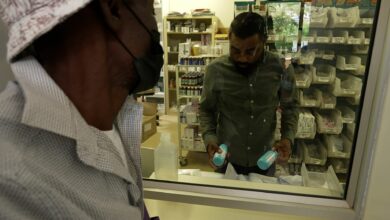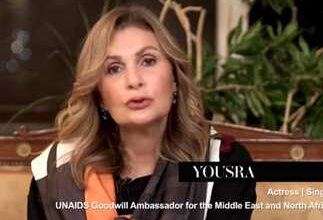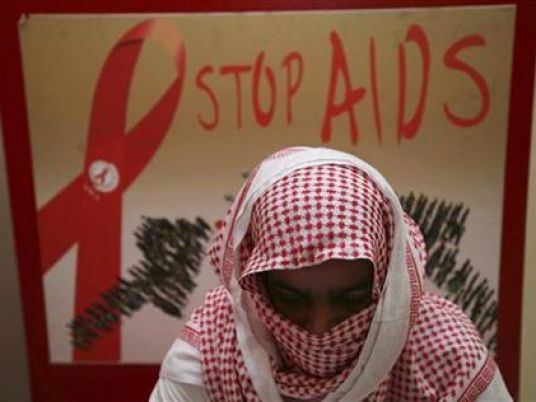As the globe marks World Aids Day (WAD) on 1 December, Egyptian activists and HIV/AIDS-related governmental and non-governmental organizations have tried to promote local events and campaigns aimed at raising public awareness about the disease.
Under the slogan "I Am," this year’s WAD campaign seeks to highlight issues of inclusion, universal access to treatment and human rights. This year’s campaign is of particular significance because it comes on the eve of the 2010 review of the United Nation’s "Millenium Development Goals," the sixth goal of which is "to combat HIV/AIDS, malaria and other diseases."
This year’s theme is of particular relevance to Egypt. According to the UN’s HIV/AIDS Regional Program in Arab States (HARPAS), nearly 10,000 Egyptians are currently living with HIV. Of these, only 1600 are formally registered with the Health Ministry.
Although the Arab world generally remains a low-incidence region for HIV/AIDS, this is no reason for complacency — especially given the fact that the Arab world is the second fastest-growing region in terms of HIV-positive cases.
There are a number of Egypt-specific factors that serve to augment people’s vulnerability to the virus. Aside from overpopulation and illiteracy — both of which are considered risk determinants for HIV and other epidemics — 20 percent of Egyptians are said to suffer from hepatitis C. What’s more, up to 30 percent of married women in remote rural areas suffer from sexually-transmitted diseases (STDs). Both of these factors can make people particularly vulnerable to HIV infection.
Meanwhile, 99 percent of drug users in Egypt have never been tested for HIV, with most — 55 percent — frequently sharing syringes. Also, the use of condoms, a primary means of prevention, remains particularly low. According to one study, only 24 percent of men surveyed had ever used condoms. UNICEF reports that the use of condoms among married women has decreased from 2.9 percent in 1995 to 1.7 percent in 2005.
Unfortunately, there is little conclusive data regarding particular risk groups, such as homosexuals, intravenous drug users, prison inmates and sex workers. Nevertheless, studies suggest that incidence rates of HIV/AIDS among these groups is far greater than for the rest of the population. For instance, a sample of homosexual men in Egypt revealed an HIV/AIDS prevalence rate of 6.2 percent.
Considered by some a divine punishment for wrongdoing, the stigma associated with HIV/AIDS in Egypt remains formidable, preventing national dialogue about the epidemic.
The World Aids Day Campaign’s chapter in Egypt represents a collaborative effort between various UN bodies, international NGOs, youth groups and volunteers. It has attempted to conduct local public awareness campaigns, appointing three Egyptian "ambassadors" for its 2009 campaign including television presenter Tarek Allam and actors Khaled Aboul Naga and Basma.
“The campaign is currently focusing on media, mainly television and radio, as a means of raising awareness in Egypt,” said WAD Campaign Egypt volunteer Hisham Sadek.
The media campaign has targeted both government and private news outlets with the aim of raising awareness about the syndrome. “Dr. Wessam el-Beih, chairperson of the UNAIDS country office, has appeared on Nile News and Sawt El-Arab radio,” said Giacomo Crescenzi, a UN volunteer and AIDS campaigner.
A photography contest was also launched with the aim of combating the stigma and discrimination associated with AIDS in Egypt. The contest is accepting entries until the 15th of December.
Nevertheless, few events took place in Egypt on this year’s World Aids Day, mainly because of the ongoing spread of the H1N1 virus and the restrictions associated with it. What’s more, the recently-concluded Muslim Eid el-Adha holiday, said Sadek, "has forced scheduled campaigns at Cairo University and the American University to be put on hold.”
At the very least, said Crescenzi, “a campaign involving the broadcasting of two video clips was launched today in the Cairo subway." A similar television campaign is scheduled to be launched within coming weeks, while an outdoor campaign — involving advertisements and fliers explaining means of transmission and protection — is currently being finalized.
In Alexandria, meanwhile, the Bibliotheca Alexandrina, in cooperation with the World Bank Public Information Center and the Egyptian AIDS society, held a public event last week devoted to "how media and non-governmental organizations can support AIDS campaigns."
Aside from the UN-sponsored campaign, the emergence of several homegrown initiatives have provided additional reasons for optimism. Optional HIV/AIDS testing has been introduced in Egyptian prisons in cooperation with the ministry of Health, "the results of which will remain secret," Dr. Ihab Abdel Rahman, director of the Health Ministry’s National Aids Program, told Al-Masry Al-Youm.




